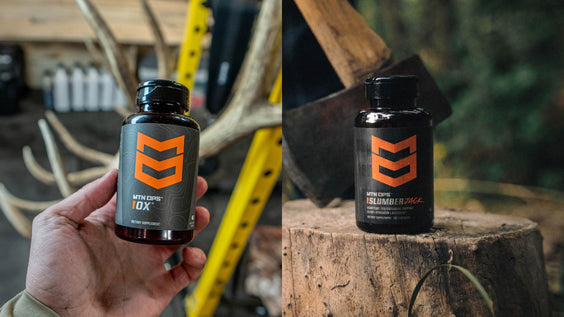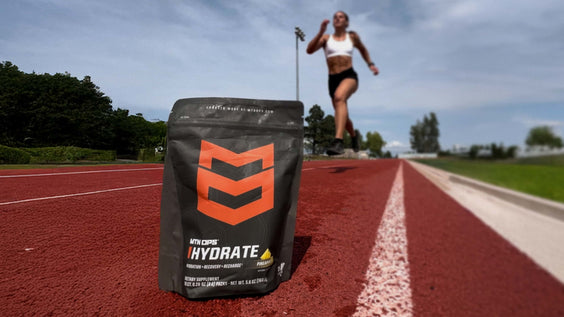

Caffeine, How Much Do You Really Need?
Oct 16, 2025
By MTN OPS TEAM
Regardless of lifestyle, everyone everywhere is all too familiar with caffeine. It’s the first thing we reach for when we are trying to get going in the morning or squeezing in those last hours, burning the late-night oil.
Despite its popularity, there still seems to be confusion. One trip to the Energy Drink section of any convenience store makes this more than a notion. Caffeine dosing ranges from a modest 40mg, found in your favorite soft drink, all the way up to 300+ mg in a single serving, creating an extremely vast and confusing landscape.
It's time to check in with true north and ask, “What does the science say?” Caffeine is one of the most studied ingredients on the market. Digging into the research can give a better understanding of what this popular ingredient is, how it works, the associated benefits and side effects, and, maybe most importantly, how much we really need.
What It Is and How It Works
Caffeine is part of a class of compounds well known for their ability to influence the central nervous system, called methylxanthines. Specifically, caffeine works by blocking adenosine receptors. Andenosine is a neurotransmitter that promotes relaxation and sleepiness. By blocking these receptors, caffeine reduces adenosine binding and promotes the benefits we know and love: alertness and feelings of energy.
Caffeine can also promote the release of other neurotransmitters, such as dopamine and noradrenaline, thereby amplifying its positive effects in the brain and creating feelings of energy and motivation.
The effects of caffeine reach well beyond the brain. Systemically, caffeine has been shown to increase heart rate, promote stronger muscular contractions, and can even influence aspects of blood flow, fuel selection, and glycogen storage (source).
Caffeine and Physical Performance
The science here is solid. Caffeine has been a go-to in the realm of sports performance for quite some time. As a whole, the research shows consistent benefits across multiple areas of physical performance, ranging from muscular strength and power to endurance when consumed in “moderate” doses (3 to 6 g/kg of body weight; roughly 270 to 545mg for the average 200lb man) (source).
Nevertheless, some research suggests that physical benefits can be seen at smaller doses. A 2008 study looked at the effects of ingesting 1, 2, and 3 mg of caffeine per kg of body weight on aerobic performance. While researchers did not report any changes at the 1mg dose, they did report that the 2 and 3 mg/kg of bw doses promoted performance by 4% and 3%, respectively.
These findings support earlier work demonstrating the positive effects of low-dose caffeine ingestion (150 to 200mg).
Interestingly, these findings do not extend to all manners of physical performance. Research from 2010 examined the effects of low-dose caffeine consumption on muscular strength and concluded that while a dose of 2 mg/ kg of body weight was not able to promote strength performance, 5 mg/kg of body weight could.
These findings seem to be more consistent with the rest of the literature. Caffeine has been shown to elicit smaller magnitudes of benefit in strength-related performances and may require a more moderate dosing scheme (3 to 6 mg/kg of bodyweight) (source).
Caffeine and Cognitive Performance
The cognitive area is where caffeine really shines. Research has consistently demonstrated its ability to promote alertness, focus, and reaction time, all at an amount that might be surprising.
A review from 2016 found that doses of roughly 40mg or 0.5mg/kg of body weight were enough to help move the needle in most areas of cognitive function. That is roughly the amount found in a standard coffee or soft drink.
These cognitive benefits may extend back into the physical realm in sports that require higher mental capacity. For example, a 2009 study looking at golfers who consumed low doses of caffeine (1.6 mg/kg of body weight) benefited not only feelings of alertness, but also putting performance. Now granted, this isn’t 40 mg of caffeine, but it isn’t 300 mg either.
When taken into consideration with the low end of physical performance, these findings suggest that about 2mg/kg of body weight is a sweet spot for backcountry hunters who need the drive to cover rough terrain but also need to maintain cognitive and physical control to land that prize bull at 200 yards.
Regaining Sensitivity: Sometimes You Need a Break
Daily caffeine use leads to tolerance, meaning that habitual use can lead to needing to consume more to achieve the same result. Luckily, there is a way to reset.
Research shows that taking a short 30-hour break from caffeine can actually result in restored sensitivity and promote greater cognitive benefits.
Physical performance may need a little more. Unlike the short turnaround time of cognitive performance, a longer period has been suggested. In a 2009 review, authors concluded that abstaining from caffeine use for seven days may be needed to see the greatest benefits.
Final Thoughts: How Much Is Enough?
The easy answer: less than you might think.
The more exact answer requires consideration for a large set of variables, like body weight and performance goals. Cognitively-based activities can start to see benefits at much lower doses (40 to 100 mg, or one to two servings of coffee or a favorite caffeinated soft drink). Physical performance benefits are going to require more (≥2 mg/kg of bodyweight, with strength-based events needing more).
Your sweet spot is as individual as you are. But by starting at the lower end, you can be sure to find the perfect dosing to help you conquer the day without overdoing it.
















































